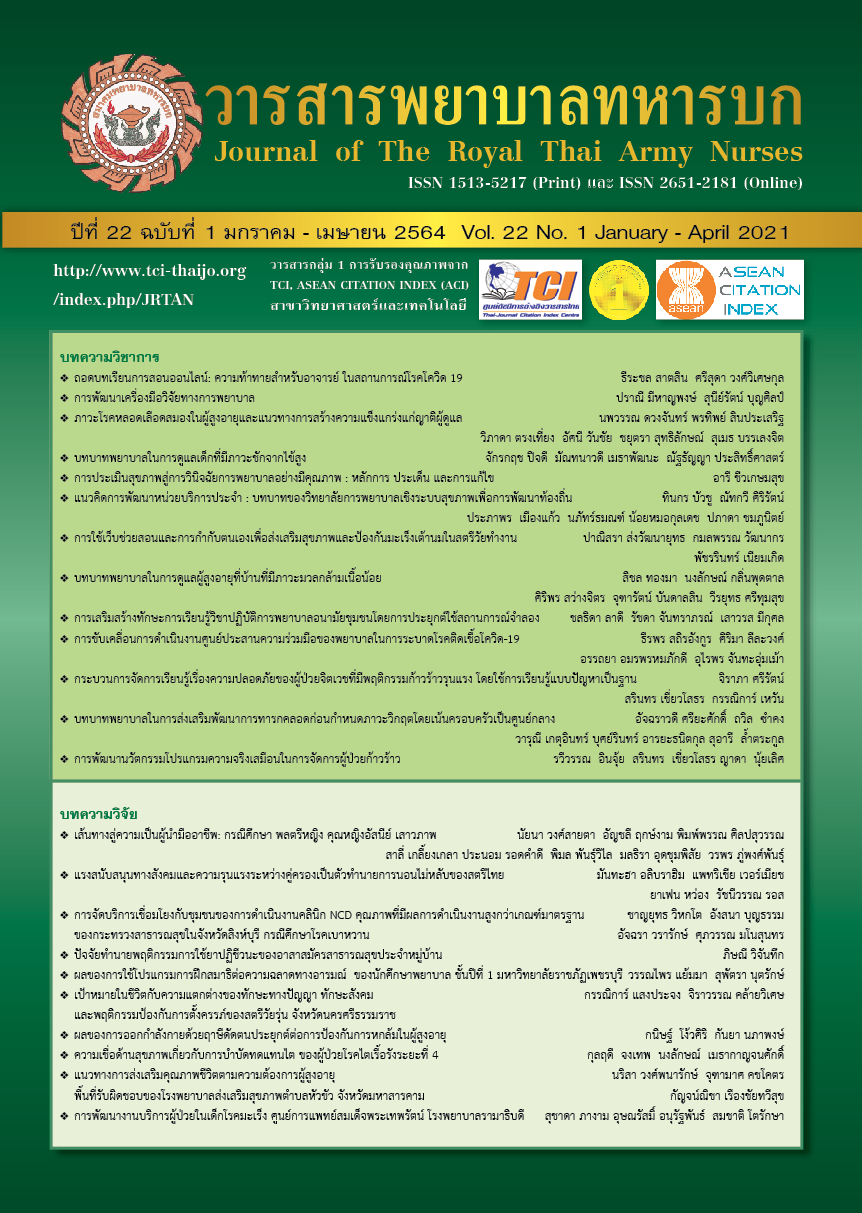The Perception of Needs in End Stage Renal Disease Patients and Caregivers for Palliative care: Phenomenological Study
Keywords:
Perception of needs, Palliative care, End stage renal diseaseAbstract
This phenomenological study had objectives to 1). Study perception of illness with end stage renal disease 2). Study of perception in palliative care of patient and caregivers, and 3). study the needs of palliative care of patient and family. The sample were 25 patients and caregivers. Data collection composed of in-depth interview, focus group and observe without participation. The questionnaire had CVI 0.81 by passing the 3 experts. Data analysis was used by content analysis.
The result found that the perception and the meaning of end stage renal disease composed of suffering disease, need to deeply understand and try to live with this disease. The problems from the disease composed of loss money, lead to be alone, encounter with many problems from disease. The perceptions of the body were stable and worse if good care it will be fine if not will lead to die, need to get hemodialysis, uncomfortable with the symptom. Moreover, the patient perceived pain as normal and natural thing that they coped, some of them wanted to die without treatment. The factors affected to quality of life composed of budget in treatment, loss of the role, relationship of family.
Downloads
References
Anand S, Khanam MA, Finkelstein FO. Global perspective of kidney disease. In: Byham LD, Burrowes JD, Chertow GM, eds. Nutrition in Kidney Disease. (2nded.) New York: Springer Science & Business Media. 2014; 11-33.
Banchen C. Fastfood sanck stimulate kidney disease in children. Thai health department, Ministry of public health.2016.
Anees M, Hameed F, Mumtaz A, Ibrahim M, & Saeed Khan MN. Dialysis-related factors affecting quality of life in patients on hemodialysis. Iranian Journal Kidney Disease. 2011; 5(1): 9-14.
Teerawattananon, Y., Mugford, M., & Tangcharoensathien, V. Economic evaluation of palliative management versus peritoneal dialysis and hemodialysis for end-stage renal disease: evidence for coverage decisions in Thailand. Value in Health, 2007; 10(1), 61-72.
Fage, H., & Joan, M. Identifying the palliative care role of the nurse working in community. International Journal of palliative nursing. 2004;10,19.
Pilaiporn Sukcharoen and Wasinee Wisesrith. Nursing Service System for Palliative Care in Tertiary Hospitals. Kuakarun Journal of Nursing Vol.21 Supplement, December. 2014;155-167.
Sanhome W. Quality of life of people who living with end stage renal disease and on Hemodialysis at hemodialysis Unit, Khon Kaen Hospital. Khon Kaen Medical Journal. 2008; 32 (1): 1-15. (in Thai).
Danquah FV, Wasserman J, Meininger J, & Bergstrom N. Quality of life measures for patients on hemodialysis: a review of psychometric properties. Nephron Nursing Journal. 2010; 37 (3): 255-69.
Bunyatnopparat K & Anutrakulchai S. Factors Associated with Life Quality of Hemodialysis Patients Dong Luang hospital, Mukdahan, Thailand. Srinagarind Medical Journa. 2017; 32 (1) :2-9. (in Thai).
Triamchaisri SK, Mawn BE & Artsanthia J. Development of a Home-Based Palliative Care Model for People living with end-stage renal disease; Journal of Hospice & Palliative Nursing. 2013; 15 (4) : E1–E11.
Setboonsrang K, Prasomrak P. The care model development for end stage renal disease patient who had renal replacement therapy on self-care and quality of life in Loengnokthacrown prince hospital, Yasothon province. Community health development quarterly Khon Kaen university. 2016; 4 (4): 485-503. (in Thai).
Artsanthia J & Swarjana, I.K. Primary Palliative Care Service in Thailand and Bali, Indonesia. Journal of the Royal Thai Army Nurses. 2014; 15 (2) :1-9. (in Thai).
Benner, P. Interpretive Phenomenology. Thousand Oak, CA: SAGE. 1994.
Agresti, A. (Ed.). (2002). Categorical data analysis (Vol.2nd ed.): New York: Wiley.
Lincoln, YS. & Guba, EG. (1985). Naturalistic Inquiry. Newbury Park, CA: Sage Publications.
Artsanthia, J., Mawn, B.E. Chaiphibalsaridi, P. Nityasuddhi, D., & Triumchaisri, S. Exploring the palliative care needs of people living in Thailand with end stage renal Disease. Journal of Hospice and Palliative Care Nursing. 2011; 13 (6): 403-10.
Ukati K, Chantajirakhovit N. Self-care agency and quality of life in end stage renal disease patients undergoing continuous ambulatory peritoneal dialysis. Songklanagarind Medical Journal. 2007; 25 (3) :171-77. (in Thai).
Avramovic M, Stefanovic V. Health-Related Quality of Life in Different Stages of Renal Failure. Artificial Organs. 2012; 36: 581-89.
Artsanthia J. Palliative Care in community with the Buddhism traditions. Journal of the Royal Thai Army Nurses. 2013; 14 (1) :123-27. (in Thai).
Artsanthia J. & Pomthong R. Nurses’role: Case study of psychological care for Caregivers of Patients with Terminal Illness. Journal of the Royal Thai Army Nurses. 2018; 19 (1) :1-8. (in Thai).
Downloads
Published
How to Cite
Issue
Section
License
บทความหรือข้อคิดเห็นใดใดที่ปรากฏในวารสารพยาบาลทหารบกเป็นวรรณกรรมของผู้เขียน ซึ่งบรรณาธิการหรือสมาคมพยาบาลทหารบก ไม่จำเป็นต้องเห็นด้วย
บทความที่ได้รับการตีพิมพ์เป็นลิขสิทธิ์ของวารสารพยาบาลทหารบก
The ideas and opinions expressed in the Journal of The Royal Thai Army Nurses are those of the authors and not necessarily those
of the editor or Royal Thai Army Nurses Association.






